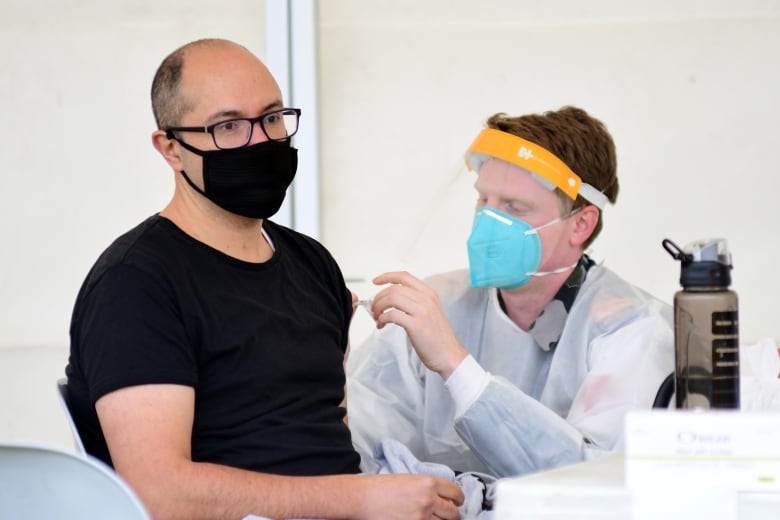Sask. chief medical health officer addresses vaccination rates, climbing hospitalizations
While other provinces bring back COVID-19 restrictions, Sask. will not at this time.

Saskatchewan's chief medical health officer says the number of COVID-19 patients in hospitals right now is concerning, but he does not think restrictions are needed at this time.
As of Wednesday, there are 108 people in hospital due to the virus, with 20 in intensive care. Dr. Saqib Shahab says the majority of those cases are unvaccinated. But, while some provinces like British Columbia are seeing a return of restrictions, Saskatchewan is not.
Meanwhile, Saskatchewan Health Minister Paul Merriman said there are signs the province is entering its fourth wave of the COVID-19 pandemic, but that the provincial government is not prepared to mandate vaccinations.
Doing so would infringe on "people's personal rights," Merriman said in a news conference at the legislative assembly on Wednesday, following pressure from the Opposition to mandate vaccines among some groups, including health-care workers.
A provincial mask mandate or a vaccine passport system have also been ruled out, according to Merriman.
On Tuesday, Manitoba announced it will require vaccinations for provincial health-care workers, teachers, and those who work with vulnerable populations.
It also reintroduced indoor masking.
Manitoba is also expanding the list of services and activities that can only be accessed if someone is fully immunized against COVID-19.
Over in Quebec, the provincial government is putting into place a vaccine passport system starting Sept. 1 that will effectively bar people who aren't fully vaccinated from many non-essential activities.
But in Sask., that has been ruled out.
WATCH| Dr. Shahab says the number of COVID-19 patients in hospitals right now is concerning:
Shahab told CBC's Sam Maciag on Wednesday that institutions like universities who have implemented vaccine mandates are "leaders" in the fight against the pandemic.
"I absolutely agree that whenever there's a requirement, for example, in university students, the [vaccine] uptake does go up."
However, he questioned the necessity of provincial mandates, including masks, citing the need for voluntary compliance.
"Does there need to be more local measures in place? Do we require a stronger provincial mandate? I think this is something that needs to be discussed in an ongoing fashion," Shahab said.
While Shahab says the province will not reinstate a mask mandate at this time, he strongly recommends Sask. residents wear masks in crowded indoor spaces, whether they are vaccinated or not.
Shahab continues to implore people to take personal initiative and get vaccinated.
"We still have lots of vaccine. You know, before we get into the fall, I think it's critical that vaccine uptake goes up. And a lot of [my] colleagues are working with communities to do exactly just that."
Health care system strain
If hospitalizations continue to climb, Shahab said urgent and elective in-hospital medical care will be delayed.
"For the most part, every hospitalization right now due to COVID ... in the vast majority of cases are preventable," said Shahab.
"Healthcare providers are very frustrated and sad because whenever they look after a person who's unvaccinated in hospital everyone feels that this is preventable, as do many patients and families of loved ones who end up in hospital."
Shahab said the province should only be seeing 20 or 25 daily COVID-19 hospitalizations right now. However, higher vaccination rates are needed first.
"We can easily vaccinate another 15 per cent within a week or two, first dose and then second dose within four weeks. That can decrease hospitalizations by 50 per cent or more."
Shahab said more consistent mask use in indoor settings can decrease hospitalizations. But again, a provincial mandate is not in the cards at this time.
Sask.'s vaccination progress
Shahab said the province has seen a high uptake in COVID-19 vaccinations, particularly with residents 60 and older.
"And because of that, thankfully, we are not seeing high rates of hospitalization and death in the most vulnerable. And even though we get occasional importation of cases in long term care facilities, thankfully the vaccines are protecting the most vulnerable and we're not seeing large outbreaks and hospitalization," he said.

The chief medical health officer also said the vaccines have proven to be effective in preventing serious illness. While some who are vaccinated can still contract the virus and have mild illness, about 80 per cent of daily COVID-19 cases in the province are unvaccinated, he said.
"If you are fully vaccinated, 60 per cent of the time you will not get any illness. And 20 per cent of the time you will be asymptomatic, but may shed virus for a short period of time ... and 20 percent of people will generally get mild illness," said Shahab.
"Even if you are older or have risk factors, the breakthrough rates suggest that usually you just get a mild illness unless, of course, you have immune suppression or other comorbidities."
However, if people are unvaccinated, Shahab said the virus is worse than it was in 2020 due to variants.
Vaccination rates among children ages 12 and older, as well as their parents, are lower than other groups. But, Shahab said there is still time to protect yourself and get vaccinated as the school year begins.
With files from Sam Maciag



